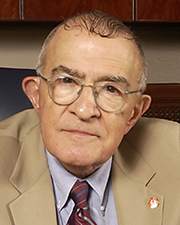Stanley G. Schultz, MD, was appointed dean of The University of Texas Medical School at Houston (now McGovern Medical School) in June 2004, following a year of service as interim dean.
A faculty member at the Medical School since 1979, Schultz was the former chair of the Department of Physiology and Cell Biology (1979–1995) and held the Fondren Family Chair in Cellular Signaling. He also served as associate dean for institutional advancement before his retirement in 2010.
He is widely recognized as both an outstanding scientist and educator who made numerous contributions to our understanding of epithelial ion transport. His early work demonstrated, for the first time, sodium-coupled sugar and amino acid absorption by the small intestine. These and subsequent findings established the “sodium-gradient” hypothesis and provided the rationale for the later development of oral rehydration therapy. He was also one of the first to recognize the roles of paracellular pathways in epithelia and suggested, with colleagues, a cellular model for chloride secretion by epithelial cells that is now widely accepted. His many contributions including popular textbooks have placed his name on lists of the 1,000 most-cited contemporary scientists and the 35 most-cited contemporary physiologists by the Institute for Scientific Information.
A native of New York City, he received his baccalaureate, summa cum laude, from Columbia University and his medical degree from New York University. After serving an internship and residency in internal medicine, he became a fellow in cardiology and developed an interest in electrocardiography. This interest prompted him to learn more about membrane biophysics and led him to join the Biophysical Laboratories of the Harvard Medical School under the direction of A. K. Solomon in the late 1950s.
In 1962, he was inducted into the Air Force as a captain in the Medical Corps and was stationed at the Brooks Aerospace School of Medicine in San Antonio, Texas, where he taught radiation biology, monitored research contracts, and conducted research regarding the biological effects of radiation. This work led to his lifelong interest in epithelial transport.
Returning to Harvard as an Established Investigator of the American Heart Association in 1964, he was recruited within three years to join the Department of Physiology at the University of Pittsburgh School of Medicine as an associate professor and was promoted to the rank of professor.
Since his arrival at the Medical School, he was recognized continually for his research, administrative leadership, and popularity among the students and faculty for his teaching abilities. His lectures were known to bring standing ovations, and his enthusiasm and dedication to teaching resulted in numerous teaching and faculty awards. In 1999, he received the President’s Scholar Award from UTHealth for his many teaching accomplishments.
A member of the American Physiological Society three decades, Dr. Schultz served as president from 1992-1993. Among his many editorial roles for professional journals in his field, he served as editor of the American Journal of Physiology and the Journal of Applied Physiology (sections on gastrointestinal physiology), Physiological Reviews, and News in Physiological Sciences. Through his popular textbooks and nearly 200 professional publications, he was well-recognized throughout the scientific community.
In 2000, the American Physiological Society honored his many contributions with their prestigious Daggs Award. He was elected to membership in the Association of American Physicians in 1981; he was granted an honorary fellowship in the American Society of Gynecology and Obstetrics in 1985; and in 2004 Dr. Schultz was elected to membership in the European Academy of Sciences. On January 31, 2007, he received the 2006 Prince Mahidol Award in Medicine from the King of Thailand in Bangkok in recognition of his work that established the scientific foundation of oral rehydration therapy (ORT); ORT has been credited with saving over 75 million lives of patients suffering from dehydration due to diarrheal diseases during the past five decades. In 2012, the World Health Organization found ORT second only to vaccinations as a life-saving intervention. In September 2007, he received the “Seeds of Hope” award from RESULTS for his contributions benefiting child health. He died Oct. 23, 2014.
